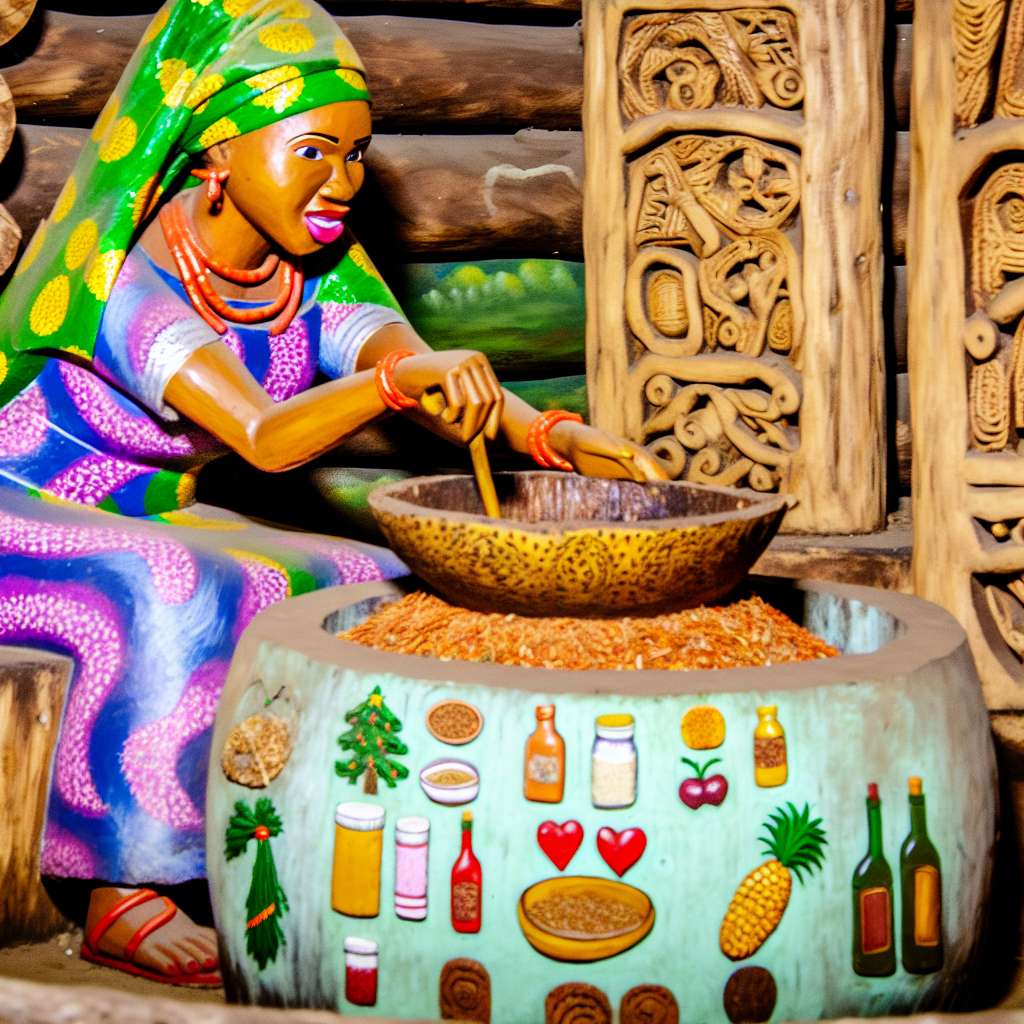The Role of Traditional Food in Nigerian Courtship Rituals
Significance of Food in Courtship
Traditional food plays a crucial role in Nigerian courtship rituals.
It serves as a symbol of love, care, and respect between suitors and their families.
Offering food during visitation signals intentions and goodwill towards marriage prospects.
Moreover, it showcases cultural heritage and family values through culinary traditions.
Families use food choices to convey messages of acceptance and honor.
Common Traditional Foods Used in Courtship
Popular dishes like amala, pounded yam, and efo riro often feature in these ceremonies.
These meals reflect regional pride, such as jollof rice in the West or basa fish in the East.
Families prepare delicacies to impress and demonstrate their readiness for marriage ties.
Alongside food, drinks like palm wine are shared to symbolize unity and celebration.
Food as a Medium of Communication
Food acts as a nonverbal expression of affection and commitment during courtship.
Sharing a meal fosters connection and mutual understanding between couples and families.
It also signals the seriousness of the suitor’s intentions to the bride’s family.
In this way, food becomes a powerful cultural language in romantic relationships.
Expressions of Love Through Traditional Food in Nigerian Marriages
Food Preparation as an Act of Love
Preparing traditional dishes requires time, effort, and skill, showing genuine care.
Wives often express love by cooking favorite dishes for their husbands and families.
Husbands, in turn, may appreciate food gifts to reaffirm emotional bonds.
Recipes passed down generations strengthen family ties and shared identity.
Celebratory Feasts and Bonding
Weddings and anniversaries feature large feasts featuring traditional Nigerian foods.
These meals celebrate love and unity within extended families and communities.
Guests enjoy diverse dishes representing the couple’s cultural backgrounds.
Feasting encourages social bonding and joyful remembrance of marital commitment.
Traditional Food as a Symbol of Prosperity and Well-being
Abundant and delicious food symbolizes prosperity and a hopeful future together.
Sharing such meals reassures couples and families about stability in marriage life.
Consequently, food embodies both love and the desire for lasting happiness.
Through these culinary expressions, Nigerian marriages celebrate emotional and cultural richness.
Symbolism of Specific Nigerian Dishes in Conveying Affection and Commitment
Jollof Rice as a Celebration of Unity and Joy
Jollof rice stands out as a vibrant symbol in Nigerian marriages.
It combines ingredients from various regions, symbolizing unity.
Moreover, serving jollof at weddings expresses joy and shared happiness.
The vibrant red color often signifies love and passion between couples.
Thus, jollof rice conveys both communal bonding and romantic affection.
Pounded Yam and Egusi Soup Representing Support and Stability
Pounded yam paired with egusi soup showcases care and nurturing.
The effort required to prepare pounded yam mirrors commitment and patience.
Egusi soup, rich and hearty, symbolizes nourishment and protection.
Together, they reflect the supportive role spouses play throughout marriage.
Therefore, serving these dishes conveys a promise of steadfastness and care.
Suya as a Symbol of Passion and Intimacy
Suya, a spicy grilled meat, often signifies warmth and passion.
Its bold flavors evoke excitement and deep emotional connection.
Sharing suya during special occasions encourages intimacy and closeness.
Consequently, it embodies desire and affection between partners.
Ofada Rice and Ayamase Sauce Highlighting Heritage and Commitment
Ofada rice paired with ayamase sauce celebrates cultural identity and pride.
Preparing this dish requires skill, signifying dedication within marriage.
The distinct flavors express the uniqueness of each marital bond.
Thus, ofada rice and ayamase sauce symbolize authenticity and lasting commitment.
Incorporation of Dishes in Wedding Traditions
Nigerian weddings often showcase these dishes to express love visually.
The careful selection and preparation reflect deep respect and affection.
Guests interpret these foods as tokens of the couple’s intentions.
Therefore, traditional dishes serve as edible expressions of marriage vows.
Symbolic Meanings of Nigerian Cuisine Dishes
- Jollof rice expresses unity and shared joy.
- Pounded yam and egusi soup demonstrate support and care.
- Suya symbolizes passion and emotional intimacy.
- Ofada rice with ayamase sauce highlights heritage and loyalty.
- Collectively, these dishes convey complex emotions effectively.
Preparation of Traditional Meals as a Demonstration of Care and Dedication by Spouses
Cultural Significance of Meal Preparation
In Nigerian marriages, preparing traditional meals symbolizes deep affection between spouses.
Often, the wife or husband takes time to select fresh ingredients thoughtfully.
This act conveys respect, care, and a commitment to nurturing the relationship.
Moreover, dishes passed down through generations hold sentimental value to families.
Therefore, cooking these meals strengthens the couple’s bond and honors their heritage.
Expressions of Love Through Cooking
Spouses express love by dedicating time and effort to cooking traditional recipes.
They carefully follow intricate recipes shared by parents or elders.
This dedication shows a willingness to embrace family traditions fully.
Consequently, the preparation becomes an intimate form of communication.
For example, when Emeka prepares amala for his wife, it shows his attentiveness and love.
Shared Responsibilities in Meal Preparations
In many households, couples jointly participate in cooking traditional meals.
They split tasks like chopping vegetables, marinating meats, and stirring pots.
This teamwork highlights mutual respect and cooperation in marriage.
Furthermore, involving children in cooking passes down cultural knowledge.
Thus, meal preparation becomes a family act filled with love and unity.
Special Occasions and Symbolic Foods
Couples often prepare elaborate traditional feasts during festivals and anniversaries.
These meals include symbolic dishes like pounded yam, jollof rice, and nkwobi.
Preparing such foods together reflects shared joy and festivity.
Additionally, it marks milestones and renews the marital bond.
Hence, traditional food preparation conveys celebration and ongoing commitment.
Discover More: How Nigerian Marriages Reflect Tribal Identity
How Communal Eating During Wedding Ceremonies Fosters Love and Unity Among Families
Bringing Families Together Through Shared Meals
Communal eating plays a vital role in Nigerian wedding ceremonies.
It creates a warm environment where both families connect deeply.
When relatives share traditional dishes, they express care and acceptance.
This practice strengthens bonds beyond the couple.
It also includes extended family members in meaningful ways.
Moreover, it breaks barriers and encourages open communication across generations.
The Symbolism of Traditional Foods in Unity
Traditional Nigerian meals carry rich symbolic meanings during weddings.
Dishes like jollof rice and pounded yam showcase cultural heritage.
Serving these iconic foods signifies respect and shared values between families.
Each ingredient often represents prosperity, fertility, or harmony.
The preparation process involves collaboration, further enhancing unity.
The Role of Shared Dining in Building Trust
Eating together builds trust and nurtures goodwill among wedding guests.
Families engage in lively conversations while enjoying diverse flavors.
This friendly setting fosters mutual understanding and emotional warmth.
Additionally, communal meals allow guests to celebrate the couple’s new journey.
The collective experience creates lifelong memories that cement family ties.
Customs That Encourage Inclusion and Participation
Most Nigerian weddings include food rituals inviting every guest’s participation.
Family elders often lead the serving, showing respect for tradition.
Younger members assist, symbolizing welcoming into the family circle.
Hosts ensure everyone receives ample portions, demonstrating generosity.
Such customs reinforce a sense of belonging and shared happiness.
Food as an Expression of Love and Hospitality
Preparing and serving food reflects genuine love between families.
Hosts invest time and effort to present delicious, colorful dishes.
They use meals as a language to say “you are welcome” and “we care.”
This heartfelt hospitality transforms the wedding into a joyous, intimate event.
Ultimately, communal eating nurtures bonds that last beyond the celebration.
Explore Further: Why Marriage is Central to Nigerian Community Celebrations
The Significance of Gifting Traditional Food Items as a Token of Love
Cultural Symbolism of Traditional Foods
Traditional foods carry deep cultural meanings in Nigerian marriages.
They symbolize respect, unity, and the blending of families.
For example, presenting pounded yam or amala reflects commitment and care.
Therefore, gifting these foods conveys sincere affection beyond words.
Strengthening Bonds Through Food Gifting
Giving traditional food items strengthens emotional connections between couples.
It shows attentiveness to each other’s heritage and tastes.
Moreover, it sparks joyful memories of shared family celebrations.
Thus, couples feel more closely bound by their cultural roots and mutual love.
Common Traditional Food Gifts in Nigerian Marriages
Families often gift items such as kolanut, dried fish, and locally brewed drinks.
These items symbolize hospitality, prosperity, and goodwill.
Furthermore, gifting spices used in favorite dishes hints at nurturing the marital bond.
- Kolanut for blessings and unity
- Dried fish representing sustenance and care
- Herbs and spices signifying health and flavor in marriage
Ritual Importance of Food Gifts During Marriage Ceremonies
Traditional food gifts play key roles in wedding rituals and ceremonies.
They mark the acceptance of new family members and new beginnings.
Additionally, these offerings serve as peace tokens between families.
Hence, presenting food creates harmony and mutual respect across relationships.
Expressions of Gratitude and Affection Through Food
Traditional food gifts express gratitude for partners and their families.
Often, food is prepared lovingly to celebrate milestones and achievements.
Consequently, food serves as a powerful love language in Nigerian marriages.
It beautifully showcases thoughtfulness and genuine affection for each other.
Find Out More: How Nigerian Culture Influences Gender Roles in Marriage
Regional Variations in Traditional Foods and Their Unique Meanings in Marriage Contexts
Igbo Traditional Foods and Their Significance
In Igbo marriages, traditional foods symbolize unity and respect.
For instance, Ofe Nsala, a white pepper soup, represents purity in the union.
Additionally, Nkwobi, a spicy cow foot dish, signifies strength and endurance.
During wedding ceremonies, serving pounded yam shows honor to guests and family.
Moreover, exchanging kola nuts embodies hospitality and blessings for the couple’s future.
Yoruba Traditional Foods in Marriage Celebrations
The Yoruba people use food as a language of love and commitment.
Amala paired with gbegiri and ewedu reflects prosperity and cultural pride.
Furthermore, Asun, a spicy roasted goat meat, represents passion and zest.
The presentation of yam during marriage ceremonies symbolizes fertility and growth.
Also, serving jollof rice celebrates joy and communal happiness shared with family.
Hausa Traditional Foods and Their Cultural Messages
Hausa weddings highlight love through distinct traditional dishes.
Tuwon Shinkafa, a rice-based staple, reflects sustenance and care.
Alongside, miyan kuka, a baobab leaf soup, signifies resilience and health.
The offering of suya, spicy grilled meat, symbolizes protection and bravery.
Likewise, the sharing of sweets like kulikuli embodies sweetness in marital life.
Cross-Regional Foods and Shared Meanings
Despite differences, some foods cross cultural boundaries in Nigerian marriages.
For example, pounded yam enjoys widespread symbolic meaning of unity.
Similarly, palm wine serves as a universal celebratory drink linking families.
Also, kola nuts maintain significance as a symbol of goodwill across many groups.
These shared traditions strengthen bonds beyond regional differences in marriage ceremonies.
Symbolism Embedded in Food Presentation and Consumption
The way food is presented plays a crucial role in conveying love.
In many regions, serving dishes to elders shows respect and family approval.
Moreover, the bride and groom often share a meal publicly to signify partnership.
Exchange of food items during ceremonies symbolizes generosity and mutual care.
Therefore, food acts not only as nourishment but also as an expression of deep affection.
Delve into the Subject: The Role of Culture in Shaping Modern Nigerian Marriages

The Role of Traditional Food in Reconciliation and Strengthening Marital Bonds
Traditional Food as a Gesture of Love and Peace
Traditional food plays a crucial role in Nigerian marriages.
It symbolizes love, respect, and a desire for harmony between spouses.
When conflicts arise, couples often turn to shared meals to reconcile.
Presenting a carefully prepared dish demonstrates sincere apology and goodwill.
For example, many Igbo couples use “ofe nsala” to express peace and forgiveness.
Similarly, a Yoruba couple might share “amala” with “ewedu” to restore affection.
These dishes go beyond nourishment; they act as emotional bridges.
Shared Meals Enhance Emotional Connection
Couples who eat traditional meals together rebuild trust and deepen bonds.
This shared ritual reinforces cultural identity and mutual understanding.
Moreover, preparing food together encourages teamwork and affection.
Many Nigerian couples view food as a language that conveys care and commitment.
The sensory experience of taste and aroma awakens fond memories and positive feelings.
Therefore, traditional food often brings couples closer after misunderstandings.
Foods Commonly Used in Marital Reconciliation
The types of food chosen for reconciliation vary by ethnic group.
Each dish carries specific cultural significance and meaning.
- Yam dishes: Symbolize strength and longevity in marriage.
- Rice and stew: Represent abundance and shared prosperity.
- Bean cakes (Akara): Suggest renewal and fresh beginnings.
- Okra soup: Signifies unity and cooperation.
Choosing these foods carefully communicates respect and heartfelt intentions.
Family Involvement in Food-Centered Reconciliation
Extended families often participate in food-related reconciliation events.
They provide support and help mediate misunderstandings over shared meals.
Involving elders adds authority and encourages lasting peace.
Group meals reinforce communal values and collective responsibility.
This tradition strengthens the marriage by involving the broader social network.
Thus, traditional food acts as a powerful tool for healing and unity.
Incorporation of Ancestral Recipes to Honor Love and Heritage in Nigerian Marriages
Cultural Significance of Traditional Recipes
Traditional recipes carry the rich history of Nigerian families across generations.
They symbolize love, respect, and connection to ancestors.
Thus, preparing ancestral dishes during weddings honors family heritage.
For instance, the Ajayi family from Ibadan proudly serves isi ewu, a signature dish passed down.
This practice strengthens marital bonds through shared cultural identity.
Preservation of Family Traditions Through Food
Families carefully pass down ancestral recipes from mothers to daughters.
This transfer of knowledge preserves culinary skills and family stories.
Moreover, these recipes embody the values and experiences of forebears.
During marriage ceremonies, such dishes remind couples of their roots.
Additionally, they help in blending two families’ unique traditions harmoniously.
Expressing Love Through Food Preparation
Cooking traditional meals demonstrates devotion and care for one another.
Preparation often involves collective family effort, symbolizing support in marriage.
Couples exchange and prepare sacred recipes to deepen their emotional connection.
Likewise, elders bless the newlyweds by sharing secret ingredients and cooking techniques.
This act conveys wishes for a prosperous and loving union.
Popular Ancestral Dishes Celebrated in Marriages
Delicious offerings like jollof rice, pounded yam, and egusi soup feature prominently.
Each dish carries meaning reflecting abundance, unity, and fertility.
Furthermore, fermented dishes such as ogiri add distinct ancestral flavors.
Below is a list of revered traditional dishes commonly served:
- Oha soup from the Igbo tribe
- Banga soup from the Niger Delta region
- Ofada rice paired with ayamase sauce
- Moin-moin steamed bean cake
These dishes celebrate diverse Nigerian cultures while conveying heartfelt traditions.
The Impact of Traditional Food-Sharing on Emotional Intimacy Between Couples
Cultural Significance of Food in Nigerian Marriages
Traditional food plays a vital role in Nigerian marriages.
It symbolizes care, respect, and deep connection between partners.
Moreover, sharing meals represents the union of two families and cultures.
Couples often use food to communicate love beyond words.
For example, Amaka prepares Uyo soup to express affection to her husband, Emeka.
Sharing Meals as an Expression of Love
Couples strengthen their emotional bond through communal dining.
Eating traditional dishes together fosters warmth and trust.
Additionally, it creates moments of shared joy and comfort.
For instance, during festivals, Ngozi and Ifeanyi enjoy pounded yam and egusi stew.
Such experiences deepen their appreciation for each other.
The Role of Food Preparation in Building Connection
Preparing traditional meals requires effort and patience.
Women like Zainab often invest time to perfect family recipes.
This dedication symbolizes commitment and nurturing in marriage.
Furthermore, men participating in cooking honor their partner’s culture and values.
Therefore, cooking together enhances mutual respect and intimacy.
Traditional Food Rituals that Enhance Emotional Intimacy
Nigerian marriages often include rituals centered on food.
Ceremonial feeding during traditional weddings signifies unity and trust.
Similarly, sharing leftovers shows care and concern for each other.
These customs create emotional safety and strengthen couple relationships.
Thus, food becomes a tangible manifestation of love and commitment.
Benefits of Food-Sharing on Marital Happiness
Regular food-sharing boosts communication and understanding between spouses.
It reduces conflicts by creating space for bonding and relaxation.
Moreover, it instills a sense of belonging and partnership.
Experiences like Sunday family meals with dishes like jollof rice bring joy to couples like Adaeze and Kelechi.
Traditional food-sharing nurtures lasting emotional intimacy in Nigerian marriages.
Evolving Traditions: Blending Traditional Food with Modern Expressions of Love in Nigerian Marriages
Significance of Traditional Food in Nigerian Marriages
Traditional food remains a powerful symbol of love in Nigerian marriages.
Couples often use these dishes to express commitment and deep affection.
Moreover, traditional meals connect partners to their cultural roots and families.
This connection creates a shared experience that strengthens marital bonds.
Incorporating Modern Influences into Culinary Traditions
Recently, many Nigerian couples blend traditional dishes with modern culinary ideas.
For example, they may present classic jollof rice with gourmet twists.
Chefs like Chinedu Eze innovate by adding new flavors to old favorites.
These adaptations keep traditions alive while appealing to today’s tastes.
Creative Expressions of Love Through Food
Beyond meals, food serves as a medium for romantic gestures in marriages.
Couples surprise each other with homemade delicacies on special occasions.
Additionally, personalized recipes honor family heritage and shared memories.
These actions communicate care and thoughtfulness effectively and warmly.
Role of Family and Community in Culinary Traditions
Family gatherings often center around traditional food during celebrations.
These events encourage collective participation and intergenerational exchange.
Community members support couples by preparing iconic dishes collaboratively.
This shared effort symbolizes communal love and blessings for the marriage.
Emerging Trends in Nigerian Marital Food Traditions
Technology increasingly influences how couples access recipes and cooking tips.
Social media platforms showcase innovative food ideas and cultural fusions.
Consequently, younger generations enjoy experimenting while respecting traditions.
This evolution ensures that food’s role as an expression of love endures.
Additional Resources
My Wife Is Nigerian of Course I’m Learning Pidgin | TikTok
Yoruba Wedding Tradition: A Guide to the Meaningful Yoruba …




